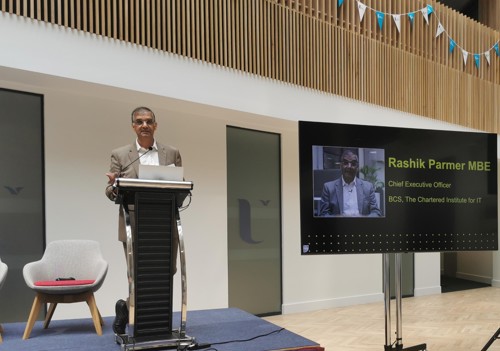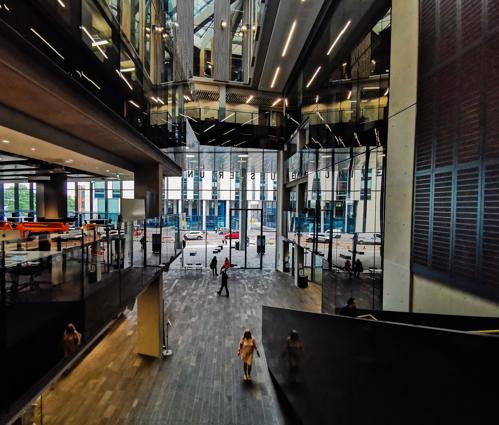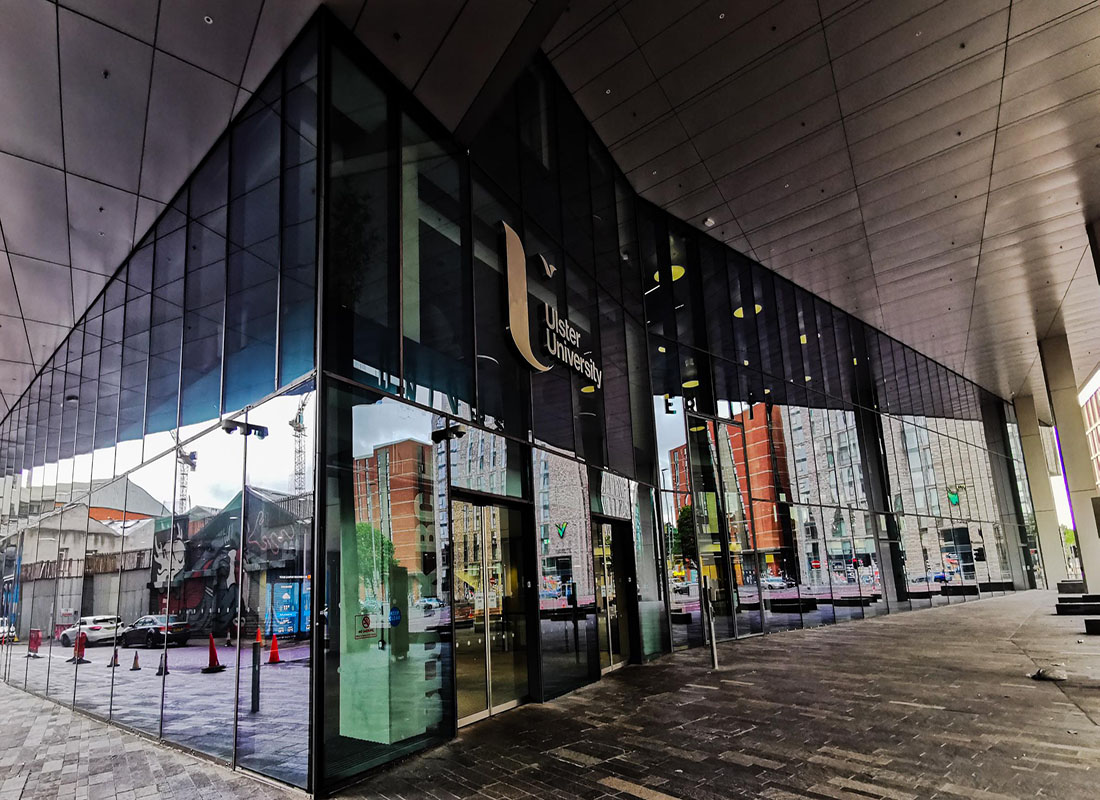The BCS Chair of Council and former Northern Ireland branch chair curated an event, held in June, focused on collaborating and innovating around NI’s most significant tech-related social opportunities. Underscoring an indelible theme of education, equality, diversity and inclusion, the ambitious and successful event also saw BCS Council meet outside London.
A busy, well attended two-day BCS event held at multiple venues across Belfast aimed to explore how the tech industry and tech professionals can help improve equality, diversity and inclusion (EDI) and bridge the digital divide in Northern Ireland.
Along with EDI, the event also focused on education and the importance of ensuring every child is equipped to thrive in our increasingly digital world.
The whole event — which also marked BCS Council’s first meeting outside London — had many essential themes. The most vivid and recurring was collaboration, and how meaningful collaboration between industry, education, academia and charities is vital to enabling digital technology to realise its full potential as a force for good.
The event was built around thought provoking, interactive, expert-led panels, debates and roundtables. Each event also provided space and opportunities for professionals across sectors to meet, network, connect and lean into the event’s core EDI and digital divide focuses.
Speaking about the event’s central themes, event organiser Rachel Steenson FBCS, Chair of Council, said: ‘Equity, diversity and inclusion is a major area of focus for us.’
The BCS Council is an elected and volunteer-led committee that acts as a sounding board for the Trustee Board, offering advice on BCS’ direction and strategy. There are 37 council members in total, and elections for new members are held every year.
Diversity through action
Explaining the new approach that could see Council visit different BCS locations, Rachel said: ‘We believe that a great step toward creating a more diverse and accepting industry is to encourage diversity within BCS Council.’
Continuing, she explained: ‘BCS’ membership is global, and there has long been a widespread network of branches and specialist groups. We decided it would be beneficial if Council could also move away from being seen as London-centric to speak to people in their locations. It presents an opportunity to raise Council’s profile and reinvigorate BCS in Northern Ireland.’
The council meeting was held at the top of BT’s Riverside Tower, which offers far-reaching views across Belfast.

Opening an evening dinner held at Belfast’s Merchant Hotel, Rashik Parmar, Group CEO, said: ‘It’s a great pleasure to be here — it’s a great place to have the first council meeting away from London. This is an important moment for BCS.’
Digital transformation
The Merchant Hotel occupies a grand, sandstone Italianate building initially constructed in 1857 by Ulster Bank as its headquarters. Seeing symbolism in the building and how digitalisation has changed banking, resulting in the Grade A listed building needing redevelopment, Rashik said: ‘This is a good example of how digitalisation has changed the world. In the 1950s, thousands of people would have run accounts and done administrative tasks in this building.’ It’s easy to imagine how many of those manual calculations and tasks are done by computers today, and what this shift means for employment, skills and opportunities.
Moving on, he said: ‘This is also an important moment because the election is taking place, and ahead of that, BCS is taking a strong stance about the role of professionals in IT. Where we are today, at this moment, there’s strong evidence that there’s been unethical practice by IT professionals in the past — Cambridge Analytica, the Post Office Horizon IT Scandal and the Molly Russell social media tragedy.’
BCS launched its manifesto against this broader backdrop. The document, published ahead of the UK election, set out three requirements that BCS believes should be priorities for the incoming government:
- Professionalism
- Diversity
- Education
Building on the theme of digitalisation, Northern Ireland’s Justice Minister and leader of the Alliance Party — Naomi Long — spoke to attendees. Speaking at Law Society House, former engineering consultant Naomi discussed a recent transformation project focused on helping prisoners’ families book visits: behind a web interface and a text messaging booking system, the programme must address countless intricacies, interdependencies, requirements and rules. Ultimately successful, the programme is now helping families maintain contact.
For you
Be part of something bigger, join BCS, The Chartered Institute for IT.
Holly Porter, BCS’ Managing Director — Institute, said: ‘I’m very proud of everything we do as BCS in Northern Ireland. One of our strategic objectives is to build local relevance and to join the dots between different stakeholders we already engage with. We aim to build out programmes that have both professional and social impact. This is especially important for us in the devolved nations, and we recognise that each country has its own unique set of circumstances and priorities.’
Julia Adamson MBE, BCS Managing Director — Education and Public Benefit, said: ‘People make the difference…it’s about bringing people together and fostering a deep connection — deep connections enable innovation. BCS is uniquely able to create a space where incredible people can come together and do incredible things through sharing unique perspectives and ideas. It’s about being ourselves, bringing our whole selves and creating an action-orientated mindset.’
Education and EDI
Location: Ulster University, Belfast Campus, York Street

Ulster University hosted a set of panel discussions and round tables. The main focus for discussion was: why does EDI matter, and why is it taking so long?
Speaking about the session's core topic, Professor Colin Turner, Pro Vice-Chancellor and Executive Dean for Computing, Engineering and the Built Environment, Ulster University said, ‘Diversity in the workplace is essential in building tech solutions that are designed to be fully inclusive from the start. Everything from back-end design to UX to data protection and more, all benefit from having input from diverse teams who understand the unique challenges and “edge cases” that our most vulnerable members of society sometimes experience.’
Session panellists and speakers included:
- Industry leaders and practitioners from NI
- Young people from diverse backgrounds
- BCS volunteers and staff
Key themes and takeaways were:
- It is easier to move the minds of children: every child deserves a world-class digital education, and part of this must be an appreciation of differences and diversity. If we get this right, tomorrow’s engineers will arrive in the workplace viewing EDI as natural and normal. This task is hard to achieve and made harder by so many young girls dropping computing and computer science as school subjects as soon as they can in their school career
- Sustainability: engineers broke the environment, and it’s up to engineers to fix it. While the building industry and concrete might be responsible for large amounts of greenhouse gases, software and data centres are huge polluters, too
- Building inclusion and wellbeing in education: the makeup of our communities has changed markedly and now a wide spectrum of people are looking to participate in education. Yet the way education is provided hasn’t changed as much, nor has it kept pace. This is underlined by how the number of reasonable adjustments provided across the student population is growing exponentially. This sticking-plaster trend is hugely resource intensive and suggests that current assessments are unfit for huge population sectors
- Mental health diagnosis: NHS waiting lists mean students might need to wait multiple years to see a specialist — longer than a degree might take. This means many students are studying, potentially struggling, and passing through the university system without help
- The importance of data: if you can’t measure something, you can’t improve it. When it comes to building a truly impactful EDI programme, collecting data is hugely important. Diversity is more than just numbers; looking at the stories and trends in the data — and acting strategically on it — is hugely important. For small organisations with small worker communities, this can, of course, be difficult as there are fewer people about whom you can see data
- Building a welcoming culture: culture and how it is shared should begin on day one of an employee’s working life. From an organisational perspective, there’s a need to create a sense of shared purpose and a shared mission. But, this should not be done at the expense of allowing people to be authentic and bring their true selves to work. Turning this into action, one organisation rolled bank holiday provision into annual leave. This allows people from different religions to celebrate their key days and dates more equitably
- Networks and networking: it is important to encourage and allow space for culturally specific groups to form within organisations. Speakers felt that this should be employee-led rather than driven from the top down. The power of organically formed networks was most visible in university settings when speakers shared experiences about how supportive, encouraging and safe these networks can be
- Aim for small, meaningful changes: large scale changes within organisations are more costly and risky. Small ones are, however, easier and quicker. The above bank holiday programme is such an example. Another speaker talked about how their organisation realised management training was only offered to full time, office based employees. Changing this policy included a much more diverse set of people in management. Similarly, mandating specific office days may unfairly disadvantage some people
- EDI is a market differentiator: showing that you’re serious about EDI is a great way to set yourself apart, particularly in a competitive job market. Gaining a reputation for and becoming synonymous with EDI positivity is even better
- EDI training for leadership: leaders play a critical part in establishing and sharing culture. As such it is critically important that they receive up to date EDI training
- Visible leaders from different communities and backgrounds: it’s easy to recruit in your own image and straightforward to do so from your own community. It’s harder but necessary to search widely to ensure leadership represents the world it wishes to serve
- Be the change you want to see: policies are important, but EDI belongs to everyone within an organisation. This means we must all check our behaviour and be aware of any underlying and unconscious biases. Our personal responsibility extends further than this, though; we all have a responsibility to call out discrimination when we see it, be it explicit or implicit
- Neurodiversity training for managers: existing and working within strict cultural norms can be incredibly stressful and fatiguing for people with different neurological make-ups. Awareness of neurodiversity would enable managers to have meaningful conversations with employees who might be struggling, and then make simple adjustments. These might include flexible working, quiet areas or adaptive modifications to kit. The point is: education enables understanding and understanding opens the door to better workplace health and performance
Summing up the importance of EDI in the tech industry, Paul Eastwood, Partner (Contracts & Technology), Tughans Solicitors, said: ‘The pace of change in technology at the moment is incredibly exciting, particularly as tech like AI will impact almost every part of people's lives. Only by ensuring that diversity is at the heart of the development of that technology can policymakers and businesses have the confidence needed to invest, adopt and direct technology in the right ways and for the right objectives.’
The digital divide — targeted collaboration
Location: The Bobbin, Belfast City Hall
A session hosted by Dave Donaghy, Vice Chair of the BCS Digital Divide Specialist Group, and Julia Adamson MBE explored the digital divide, its causes, and why simply providing people with devices and connectivity is only part of the answer.
‘There are four key elements to the digital divide’, Julia said. ‘Firstly, there’s access. Do I have access to a device? That’s important, but it’s not the only part. There are skills — do I have the skills to take advantage of and take part in the digital economy? There’s also motivation. And finally, there’s trust — do I trust the platforms and their provenance?’
Dave echoed these observations and highlighted the importance of motivation. Looking at his BCS experiences in Bath and the surrounding area, he said: ‘It’s people sat at home in social isolation, that’s what important to me. That’s what we need to fix.’
- Collaborate with charities that help people: tech firms and practitioners know their field and their industry but might not have any direct experience of working with vulnerable communities and people with specific needs. It’s far more efficient for people and organisations to volunteer their time to work with charities — they are the experts in helping people
- Charities don’t want their walls painted: many businesses offer their employees volunteering days, but there’s sometimes no joined-up focus on who will help whom. This can lead to tech workers doing DIY jobs in charities’ HQs when what those charities really need is help with Sharepoint, a website, or cyber security. There’s a need for conversations and, ultimately, focused collaboration
- Volunteering days and outreach programmes work: speakers explained that the feedback employees received from volunteering in schools was very positive, so positive that this energy feeds into high staff retention
- Don’t overwhelm: big companies like to work with big charities, ideally on big problems. While this can help the biggest of both solve the largest problems, it can overwhelm smaller charities. Such organisations may have a small but specific need for kit or skills
- Hubs and marketplaces: there needs to be a way for charities with specific tech needs to be linked up with volunteers with the capacity and skills to meet that need — there needs to be alignment
The technology industry in Belfast
Speaking specifically about the thriving Belfast technology ecosystem, Professor Colin Turner said: ‘Belfast has a thriving IT economy. Northern Ireland has a software sector worth £1.7 billion, employing 23,000 people across approximately 2,200 businesses. Much of that is currently concentrated in Belfast, which is driven by very strong foreign direct investment. The interconnected ecosystem and strong talent pipelines in Northern Ireland attract incoming companies.’
Paul Convery, Head of BT Business Enterprise, said: ‘Key to Belfast’s growth as a successful hub is the development of innovation districts and technology parks such as the Titanic Quarter and in particular our world class universities — Queens University and Ulster University — both of which are integral to the city’s thriving knowledge economy. Our people, combined with the investment in the Belfast City Deal, create the perfect catalyst for technological innovation.’
Paul Eastwood echoed these observations: ‘Belfast has a great ecosystem for tech companies — due in large part to its universities, innovation centres and investment prospects —but what really sets it apart is the people. Belfast’s success can be attributed to its people and their graft, motivation and support.’












